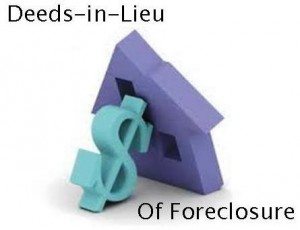Options If The Lender Rejects A Short Sale
If you are running through financial crises and unable to pay the mortgage, there are two options available. First, the short sale and second is foreclosure. Foreclosure is really hard to go with, but a short sale little bit easy than the foreclosure. A Short sale is the best alternate to avoid the foreclosure and bankruptcy. Doing a short sale is much better option than going for a foreclosure. Another option is available to avoid the foreclosure which is called “Deed in Liu”. The short sale and a deed in lieu of foreclosure are very similar options, but there are some major differences between both available options.
What is a Deed in Lieu of Foreclosure?
 A deed in lieu of foreclosure is a better option as has been said earlier. In deed in lieu of foreclosure, the property owner voluntarily gives the property to the lender and in exchange the lender cancel the loan. The item transferred is the deed to the property. In this case, lender promises not to initiate the process of foreclose and terminates if it has already been started. The lender may or may not agree to forgive any deficiency balance that results from the sale of the property.
A deed in lieu of foreclosure is a better option as has been said earlier. In deed in lieu of foreclosure, the property owner voluntarily gives the property to the lender and in exchange the lender cancel the loan. The item transferred is the deed to the property. In this case, lender promises not to initiate the process of foreclose and terminates if it has already been started. The lender may or may not agree to forgive any deficiency balance that results from the sale of the property.
Overlooked Downside
An overlooked downside to a deed in I lieu is the expectation that lender will forgive the deficiency balance. Under federal law, a creditor is required to file a 1099C whenever it forgives a loan balance greater than $600. This may create the liability on the former property owner because it is considered an “income”. However, the Mortgage Forgiveness Debt Relief Act of 2007 provides tax relief for some loans forgiven in 2007 through 2012. See the IRS document “The Mortgage Forgiveness Debt Relief Act and Debt Cancellation.”
Deficiency Balance
The major consideration in a deed in lieu of foreclosure is the willingness of lender to forgive the deficiency amount. It is recommended reading the contract carefully and see how the deficiency balance is treated. Make it sure that document clearly describe the status of deficiency balance and if there is ambiguity, consult your attorney and get the legal advice. An attorney’s time is not cheap, but will be a bargain compared to signing an agreement you do not understand and are surprised later to realize its implications.
What if the Lender Rejects a Short Sale or a Deed in Lieu of Foreclosure?
If the lender does not allow short sale or reject deed in lieu of foreclosure, foreclosure is the last option in this case. There is no doubt that foreclosure represents the major problems, but you don’t have any other option to go with. Foreclosure auction generates less money than a short sale may bring. If the proceeds from the foreclosure are lesser that the owed amount then the difference is called the “deficiency balance”.
If the house falls under the foreclosure, then it is possible to mitigate the negative impact of deficiency balance by filing the bankruptcy. Deficiency balance is treated same as the other unsecured debt in bankruptcy, meaning that they can be wiped clear by Chapter 7, and repaid over time through a Chapter 13. Bankruptcy also does not leave a positive impact and is not a positive alternate, but is the best solution for borrower if the lender does not allow to sell the home through a short sale or a deed in lieu.
It is recommended consulting an experienced attorney to understand bankruptcy law to understand all of your options to resolving your mortgage debt.
Is a ‘Short Sale’ a Better Option?
The property owner and the lender can choose to sell the home under a short sale. Both the lender and borrower are benefited from the short sale. They can avoid the complications that they may face due to the foreclosure process.
Here is the typical requirement list of short sale requirements.
1- The resident must be on the market for certain number of days (90 days are typical)
2- There can be no liens on the property.
3- The property should not be in the foreclosure already.
4- The house must be priced reasonably.
5- The seller must have a hardship
You need to make yourself ready for the process of short sale because it is a stressful process, but not as much compared to the foreclosure.
